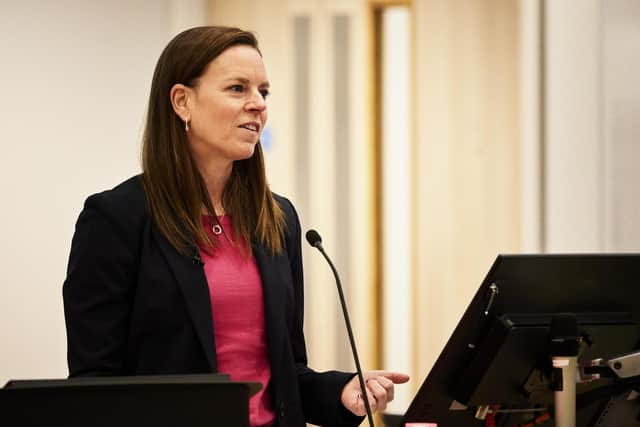I continue to worry more about inflation persistence, says Bank of England's Megan Greene
In her first speech as a member of the Bank’s Monetary Policy Committee, Ms Greene set out her approach to interest rate decisions during a speech at Leeds Business School.
In the speech, she weighed the risks of inflation persistence, in particular services inflation and wage growth, with weakening activity. She analysed how the UK’s medium-term outlook may have shifted and what this could mean for monetary policy
Advertisement
Hide AdAdvertisement
Hide AdMs Greene said: “The task for the MPC is to return inflation to our 2 per cent target in the medium-term. This can be tricky in the face of supply shocks like a pandemic and jump in energy prices.


"These shocks can cause a trade-off between bringing inflation down and avoiding a significant slowdown in growth and jump in unemployment.
“Monetary policy feeds through into the economy with a lag, so I have to make interest rate decisions based on where I expect the economy to be in the medium-term.
"Conditioned on a series of assumptions, the MPC’s November modal forecast predicts a soft landing: inflation returns to 2 per cent in 2025, growth stagnates for the next year and a half and unemployment rises to just over 5 per cent by the end of 2025."
Advertisement
Hide AdAdvertisement
Hide AdShe told the audiences that “because I come from the Dismal Science” she wanted to discuss her main concerns for how this might go wrong.
She added: “One risk is that inflation is more persistent than expected. I’m looking at a number of indicators to gauge this. One is services inflation, which is driven largely by sticky wages.
"Services inflation has fallen since the beginning of the year. But if we strip out energy-intensive services to remove the impact of lower energy costs, inflation in the remaining services has been broadly flat since April 2023.”
"The labour market also shows signs of inflation persistence. Vacancies have dropped and unemployment has ticked up, but the labour market is still tight.”
Advertisement
Hide AdAdvertisement
Hide AdShe added: “In conclusion, in order to return inflation sustainably to the target, the MPC must balance the risk of doing too little with that of doing too much. These risks are more finely balanced since earlier this summer in part as activity has weakened.
"But the data on output remains mixed, and I continue to worry more about inflation persistence.”
Ms Greene, who was appointed to the MPC in July 2023 for a three-year term, is a Senior Fellow at the Watson Institute for International and Public Affairs at Brown University and also teaches at Schwarzman College (Tsinghua University) and the European University Institute.
Prior to her appointment, Ms Greene was the Global Chief Economist at Kroll, a business services and risk mitigation firm. She was also a Contributing Editor and regular columnist at the Financial Times, writing on global macroeconomics and policy